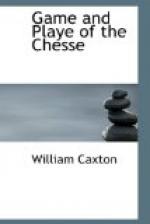Incidentally his book is a monument in the history of chess, but it was never intended to make its primary object that of teaching the game. The author’s aim was almost exclusively ethical. It was to win men to a sober life and to the due performance of individual and social duties, that the preacher exhausted his stores of learning, and invoked alike the reproofs of the fathers of the Church, the history and legend of chroniclers, pagan and Christian, and the words of prophets and poets. As a memorial of the literature and learning of the middle ages, it must always possess a permanent value. From it we may learn, and always with interest, what was the literary taste and social ideal of the thirteenth, fourteenth, and fifteenth centuries. There is, doubtless, ample room for dissatisfaction with that ideal, but it is not without some bright aspects. Possibly there are modern realms that are not any happier now than they would be if governed in strict accordance with the rules laid down by the earnest author of the game and play of the chess.
* * * * *
It only remains for the editor to thank the friends who have interested themselves in his work. Mr. J.E. Bailey, F.S.A., has shown his usual scholarly courtesy and liberality in the communication of books and references. To Mr. R.C. Christie, the Chancellor of the Diocese of Manchester, a similar acknowledgment is due. Mr. C.W. Sutton, and Mr. W.R. Credland, of the Manchester Free Library, on this, as on many other occasions, have not only given the editor many facilities for his work, but some suggestions by which he trusts he has profited. The index is chiefly the work of the editor’s eldest daughter.
[DEDICATION.]




